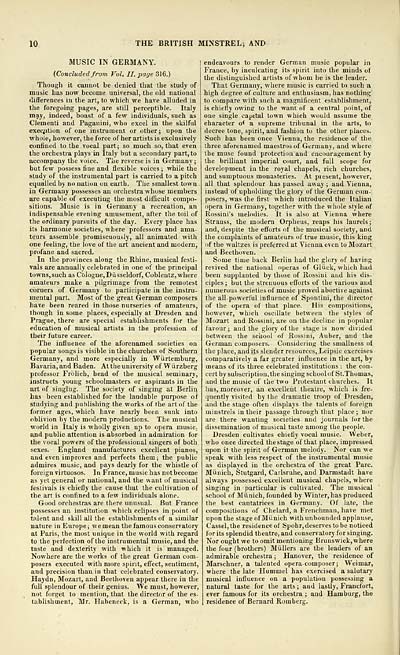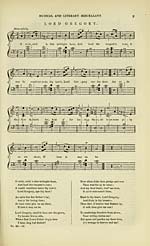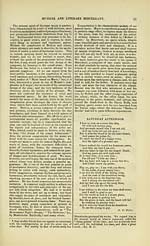Glen Collection of printed music > Printed music > British minstrel, and musical and literary miscellany
(702) Page 10
Download files
Complete book:
Individual page:
Thumbnail gallery: Grid view | List view

10
THE BRTTISH MINSTREL; AND
MUSIC IN GERMANY.
{Concluded from Vol. II. page 316.)
Though it cannot be denied that the study of
music has now become universal, the old national
differences in the art, to which we have alluded in
the foregoing pages, are still perceptible. Italy
m9,y, indeed, boast of a few individuals, such as
Clementi and Pagauini, who excel in the skilful
execjition of one instrument or other ; upon the
whole, however, the force of her artists is exclusively
confined to the vocal part ; so much so, that even
the orchestra plays in Italy but a secondary part, to
accompany the voice. Tiie reverse is in Germany ;
but few possess fine and flexible voices ; while the
study of the instrumental part is carried to a pitch
equalled by no nation on earth. The smallest town
in Germany possesses an orchestra whose members
are capable of executing the most difficult compo-
sitions. Music is in Germany a recreation, an
indispensable evening amusement, after the toil of
the ordinary pursuits of the day. Every place has
its harmonic societies, where professors and ama-
teurs assemble promiscuously, all animated with
one feeling, the love of the art ancient and modern,
profane and sacred.
In the provinces along the Rhine, musical festi-
vals are annually celebrated in one of the principal
towns, such as Cologne, Dusseldorf,Coblentz, where
amateurs make a pilgrimage from the remotest
corners of Germany to participate in the instru-
mental part. Most of the great German composers
have been reared in those nurseries of amateurs,
though in some places, especially at Dresden and
Prague, there are special establishments for the
education of musical artists in the profession of
their future career.
The influence of the aforenamed societies on
popular songs is visible in the churches of Southern
Germany, and more especially in Wiirtemburg,
Bavaria, and Baden. At the university of Wurzberg
professor Frolich, head of the musical seminary,
instructs young schoolmasters or aspirants in the
art of singing. The society of singing at Berlin
has been established for the laudable purpose oi'
studying and publishing the works of the art of the
former ages, which have nearly been sunk into
oblivion by the modern productions. The musical
world in Italy is wholly given up to opera musiC;
and public attention is absorbed in admiration for
the vocal powers of the professional singers of both
sexes. England manufactures excellent pianos,
and even improves and perfects them ; the public
admires music, and pays deaily for the whistle of
foreign virtuosos. In France, music has not become
as yet general or national, and the want of musical
festivals is chiefly the cause that the cultivation of
the art is confined to a few individuals alone.
Good orchestras are there unusual. But France
possesses an institution which eclipses in point of
talent and skill all the establishments of a similar
nature in Europe ; we mean the famous conservatory
at Paris, the most unique in the world with regard
to the perfection of the instrumental music, and the
taste and dexterity with which it is managed.
Nowhere are the works of the great German com-
posers executed with more spirit, cS'ect, sentiment,
and precision than in that celebrated conservatory.
Haydn, Mozart, and Beethoven appear there in the
full splendour of their genius. We must, however,
not forget to mention, that the director of the es-
tablishment, Mr. Habeneck, is a German, who
endeavours to render German music popular in
France, by inculcating its spirit into the minds of
the distinguished artists of whom he is the leader.
That Germany, where music is carried to such a
high degree of culture and enthusiasm, has nothing
to compare with such a magnificent establishment,
is chiefly owine to the want of a central point, of
one single capital town which would assume the
character of a supreme tribunal in the arts, to
decree time, spirit, and fashion to the other places.
Such has been once Vienna, the residence of the
three aforenamed maestros of Germany, and where
the muse found protection and encouragement by
the brilliant imperial court, and full scope for
development in the royal chapels, rich churches,
and sumptuous monasteries. At pi esent, however,
all that splendour has passed away ; aud Vienna,
instead of upholding the glory of the German com-
posers, was the first which introduced the Italian
opera in Germany, together with the whole style of
Rossini's melodies. It is also at Vienna where
Strauss, the modem Orpheus, reaps his laurels;
and, despite the efl'orts of the musical society, and
the complaints of amateurs of true music, this king
of the waltzes is preferred at Vienna even to Mozart
and Beethoven.
Some time back Berlin had the glory of having
revived the national operas of Gliick, which had
been supplanted by those of Rossini and his dis-
ciples ; but the strenuous efl'orts of the various and
numerous societies of music proved abortive against
the all-powerful influence of Spontini, the director
of the opera of that place. His compositions,
however, which oscillate between the styles of
Mozart and Rossini, are on the decline in popular
favour; and the glory of the stage is now divided
between the school of Rossini, Auber, and the
German composers. Considering the smallness of
the place, and its slender resources, Leipsic exercises
comparatively a far greater influence in the art, by
means of its three celebrated institutions : the con-
cert by subscription, the singing school of St.Thomas,
and the music of the two Protestant churches. It
has, moreover, an excellent theatre, which is fre-
quently visited by the dramatic troop of Dresden,
and the stage often displays the talents of foreign
minstrels in their passage through that place ; nor
are there wanting societies aud journals for the
dissemination of musical taste among the people.
Dresden cultivates chiefly vocal music. Weber,
who once directed the stage of that place, impressed
upon it the spirit of German melody. Nor can we
speak with less respect of the instrumental music
as displayed in the orchestra of the great Pare.
Munich, Stutgard, Carlsruhe, and Darmstadt have
always possessed excellent musical chapels, where
singing in particular is cultivated. The musical
school of Munich, founded by Winter, has produced
the best cantatrices in Germany. Of late, the
compositions of Chelard, a Frencliman, have met
upon the stage of Miinich with unbounded applause,
Cassei,the residence of Spohr, deserves to be noticed
for its splendid theatre, and conservatory for singing.
Nor ought we to omit mentioning Brunswick, where
the four (brothers) Miillers are the leaders of an
admirable orchestra ; Hanover, the residence of
Marschner, a talented opera- composer; Weimar,
where the late Hummel has exercised a salutary
musical influence on a population possessing a
natural taste for the arts ; and lastly, Francfort,
ever famous for its orchestra ; and Hamburg, the
residence of Bernard Romberg.
THE BRTTISH MINSTREL; AND
MUSIC IN GERMANY.
{Concluded from Vol. II. page 316.)
Though it cannot be denied that the study of
music has now become universal, the old national
differences in the art, to which we have alluded in
the foregoing pages, are still perceptible. Italy
m9,y, indeed, boast of a few individuals, such as
Clementi and Pagauini, who excel in the skilful
execjition of one instrument or other ; upon the
whole, however, the force of her artists is exclusively
confined to the vocal part ; so much so, that even
the orchestra plays in Italy but a secondary part, to
accompany the voice. Tiie reverse is in Germany ;
but few possess fine and flexible voices ; while the
study of the instrumental part is carried to a pitch
equalled by no nation on earth. The smallest town
in Germany possesses an orchestra whose members
are capable of executing the most difficult compo-
sitions. Music is in Germany a recreation, an
indispensable evening amusement, after the toil of
the ordinary pursuits of the day. Every place has
its harmonic societies, where professors and ama-
teurs assemble promiscuously, all animated with
one feeling, the love of the art ancient and modern,
profane and sacred.
In the provinces along the Rhine, musical festi-
vals are annually celebrated in one of the principal
towns, such as Cologne, Dusseldorf,Coblentz, where
amateurs make a pilgrimage from the remotest
corners of Germany to participate in the instru-
mental part. Most of the great German composers
have been reared in those nurseries of amateurs,
though in some places, especially at Dresden and
Prague, there are special establishments for the
education of musical artists in the profession of
their future career.
The influence of the aforenamed societies on
popular songs is visible in the churches of Southern
Germany, and more especially in Wiirtemburg,
Bavaria, and Baden. At the university of Wurzberg
professor Frolich, head of the musical seminary,
instructs young schoolmasters or aspirants in the
art of singing. The society of singing at Berlin
has been established for the laudable purpose oi'
studying and publishing the works of the art of the
former ages, which have nearly been sunk into
oblivion by the modern productions. The musical
world in Italy is wholly given up to opera musiC;
and public attention is absorbed in admiration for
the vocal powers of the professional singers of both
sexes. England manufactures excellent pianos,
and even improves and perfects them ; the public
admires music, and pays deaily for the whistle of
foreign virtuosos. In France, music has not become
as yet general or national, and the want of musical
festivals is chiefly the cause that the cultivation of
the art is confined to a few individuals alone.
Good orchestras are there unusual. But France
possesses an institution which eclipses in point of
talent and skill all the establishments of a similar
nature in Europe ; we mean the famous conservatory
at Paris, the most unique in the world with regard
to the perfection of the instrumental music, and the
taste and dexterity with which it is managed.
Nowhere are the works of the great German com-
posers executed with more spirit, cS'ect, sentiment,
and precision than in that celebrated conservatory.
Haydn, Mozart, and Beethoven appear there in the
full splendour of their genius. We must, however,
not forget to mention, that the director of the es-
tablishment, Mr. Habeneck, is a German, who
endeavours to render German music popular in
France, by inculcating its spirit into the minds of
the distinguished artists of whom he is the leader.
That Germany, where music is carried to such a
high degree of culture and enthusiasm, has nothing
to compare with such a magnificent establishment,
is chiefly owine to the want of a central point, of
one single capital town which would assume the
character of a supreme tribunal in the arts, to
decree time, spirit, and fashion to the other places.
Such has been once Vienna, the residence of the
three aforenamed maestros of Germany, and where
the muse found protection and encouragement by
the brilliant imperial court, and full scope for
development in the royal chapels, rich churches,
and sumptuous monasteries. At pi esent, however,
all that splendour has passed away ; aud Vienna,
instead of upholding the glory of the German com-
posers, was the first which introduced the Italian
opera in Germany, together with the whole style of
Rossini's melodies. It is also at Vienna where
Strauss, the modem Orpheus, reaps his laurels;
and, despite the efl'orts of the musical society, and
the complaints of amateurs of true music, this king
of the waltzes is preferred at Vienna even to Mozart
and Beethoven.
Some time back Berlin had the glory of having
revived the national operas of Gliick, which had
been supplanted by those of Rossini and his dis-
ciples ; but the strenuous efl'orts of the various and
numerous societies of music proved abortive against
the all-powerful influence of Spontini, the director
of the opera of that place. His compositions,
however, which oscillate between the styles of
Mozart and Rossini, are on the decline in popular
favour; and the glory of the stage is now divided
between the school of Rossini, Auber, and the
German composers. Considering the smallness of
the place, and its slender resources, Leipsic exercises
comparatively a far greater influence in the art, by
means of its three celebrated institutions : the con-
cert by subscription, the singing school of St.Thomas,
and the music of the two Protestant churches. It
has, moreover, an excellent theatre, which is fre-
quently visited by the dramatic troop of Dresden,
and the stage often displays the talents of foreign
minstrels in their passage through that place ; nor
are there wanting societies aud journals for the
dissemination of musical taste among the people.
Dresden cultivates chiefly vocal music. Weber,
who once directed the stage of that place, impressed
upon it the spirit of German melody. Nor can we
speak with less respect of the instrumental music
as displayed in the orchestra of the great Pare.
Munich, Stutgard, Carlsruhe, and Darmstadt have
always possessed excellent musical chapels, where
singing in particular is cultivated. The musical
school of Munich, founded by Winter, has produced
the best cantatrices in Germany. Of late, the
compositions of Chelard, a Frencliman, have met
upon the stage of Miinich with unbounded applause,
Cassei,the residence of Spohr, deserves to be noticed
for its splendid theatre, and conservatory for singing.
Nor ought we to omit mentioning Brunswick, where
the four (brothers) Miillers are the leaders of an
admirable orchestra ; Hanover, the residence of
Marschner, a talented opera- composer; Weimar,
where the late Hummel has exercised a salutary
musical influence on a population possessing a
natural taste for the arts ; and lastly, Francfort,
ever famous for its orchestra ; and Hamburg, the
residence of Bernard Romberg.
Set display mode to: Large image | Transcription
Images and transcriptions on this page, including medium image downloads, may be used under the Creative Commons Attribution 4.0 International Licence unless otherwise stated. ![]()
| Special collections of printed music > Glen Collection of printed music > Printed music > British minstrel, and musical and literary miscellany > (702) Page 10 |
|---|
| Permanent URL | https://digital.nls.uk/91443369 |
|---|
| Description | Scottish songs and music of the 18th and early 19th centuries, including music for the Highland bagpipe. These are selected items from the collection of John Glen (1833 to 1904). Also includes a few manuscripts, some treatises, and other books on the subject. |
|---|
| Description | The Glen Collection and the Inglis Collection represent mainly 18th and 19th century Scottish music, including Scottish songs. The collections of Berlioz and Verdi collected by bibliographer Cecil Hopkinson contain contemporary and later editions of the works of the two composers Berlioz and Verdi. |
|---|

